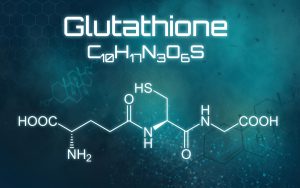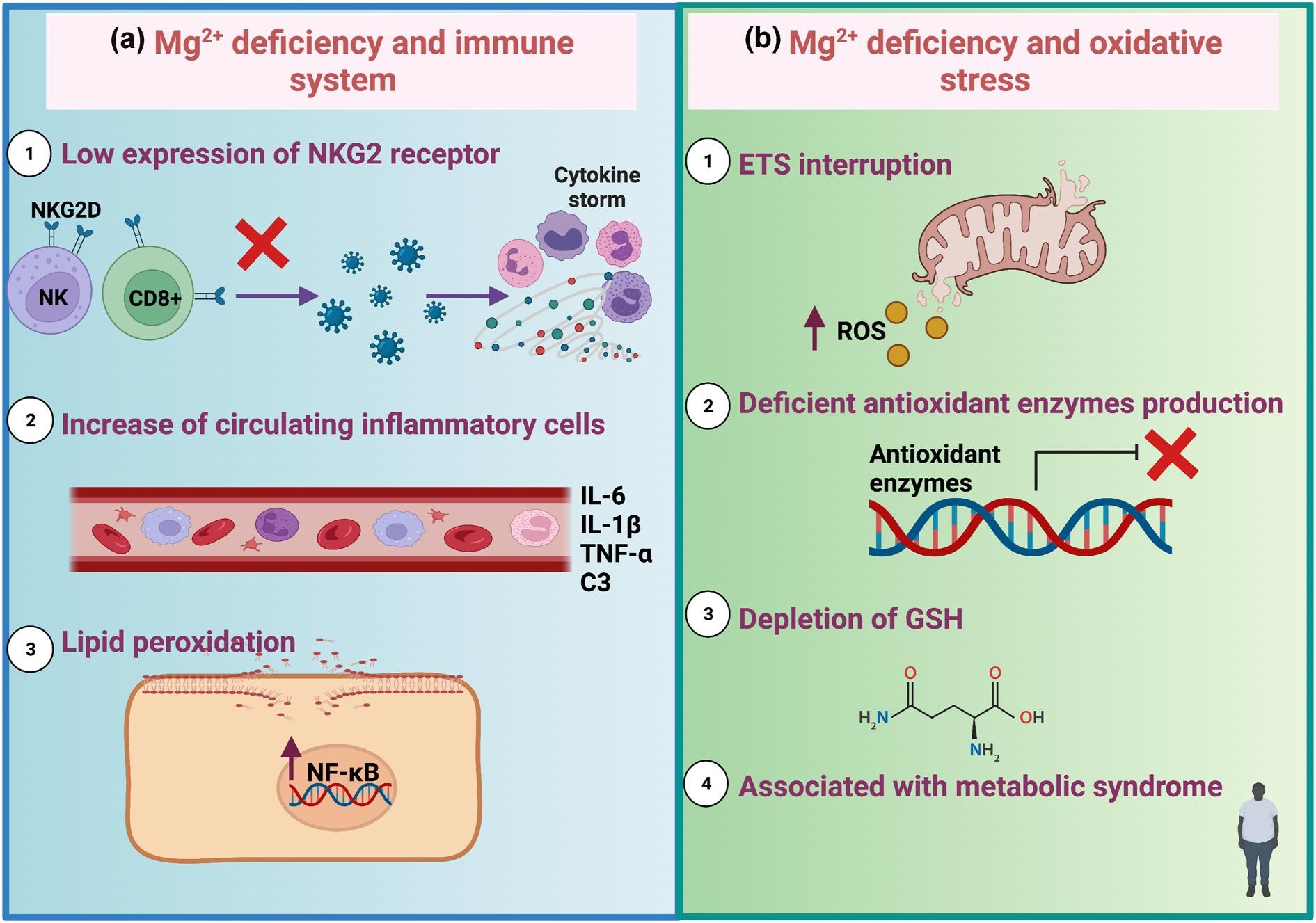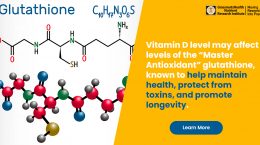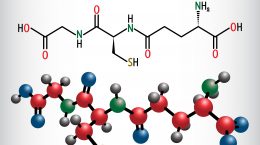Published on January 27, 2023
Glutathione levels can directly affect vitamin D status, similar to magnesium. Unfortunately, many things deplete our bodies of glutathione – here’s how to help improve glutathione production to positively affect our health as well as our vitamin D status.
Key Points
- Levels of glutathione within the cells and mitochondria are highly associated with health and longevity, and its deficiency is associated with loss of function with aging and many chronic diseases (including depression, anxiety, Alzheimer’s, Parkinson’s, heart disease, and even cancer)
- Research over the last several years has illustrated a positive relationship between glutathione and vitamin D, with higher vitamin D levels related to higher glutathione levels. Additional research has demonstrated that correcting vitamin D deficiency can, in itself, increase glutathione levels – and vice versa.
- Learn how to keep glutathione levels up with additional tips while also avoiding vitamin D deficiency
 Glutathione is known by many as the mother of all antioxidants and the master detoxifier. Levels of glutathione within the cells and mitochondria are highly associated with health and longevity, and its deficiency is associated with loss of function with aging and many chronic diseases (including depression, anxiety, Alzheimer’s, Parkinson’s, heart disease, and even cancer).
Glutathione is known by many as the mother of all antioxidants and the master detoxifier. Levels of glutathione within the cells and mitochondria are highly associated with health and longevity, and its deficiency is associated with loss of function with aging and many chronic diseases (including depression, anxiety, Alzheimer’s, Parkinson’s, heart disease, and even cancer).
Our bodies are able to naturally produce this powerful antioxidant, however, can quickly become overwhelmed with toxins and other offenders that deplete glutathione. On top of that, the production of glutathione decreases with age; when people reach age 40, they produce around 30% less glutathione, and by age 65, that reduction can reach 50%.
What is Glutathione and What Does it Do?
Glutathione is made of 3 different amino acids: cysteine, glycine, and glutamic acid. It is found in two different forms; reduced glutathione (GSH) is the “active” form that is able to repair oxidative damage, and oxidized glutathione (GSSG) is the inactive form that can be recycled back into GSH. The real “power” of glutathione is the readily available sulphur that it contains. Sulphur is sticky and grabs ahold of free radicals, toxins, and dangerous heavy metals, allowing your body to excrete these harmful substances.
Higher levels of glutathione help to slow aging, clear the body of toxins, and prevent disease. Glutathione itself neutralizes free radicals, recycles antioxidants, is involved in phase 1 and 2 detoxification, helps transport mercury out of the cells and the brain, regulates cell growth, and is vital to mitochondrial and DNA health. Proper glutathione activity also strengthens and helps modulate the immune system, helps muscle tissues recover from damage, reduces recovery time, increases strength and endurance, and more.
Increasing Vitamin D Could Help Increase Glutathione, and Vice Versa
Research has illustrated a positive relationship between glutathione and vitamin D, with higher vitamin D levels related to higher glutathione levels. Additional research has demonstrated that correcting vitamin D deficiency can, in itself, increase glutathione levels, and vice versa.
A 2018 study by Jain et al. suggests that increasing glutathione status can improve the bioavailability of vitamin D and can more effectively correct vitamin D deficiency than vitamin D supplementation alone (similar to magnesium and several other nutrients). The publication concluded that “Supplementation with a combination of vitamin D and L-cysteine or glutathione precursor, rather than supplementation with vitamin D alone, is beneficial and helps achieve more successful vitamin D supplementation.”
Another paper by A. Polonikov even suggests that the primary cause of COVID-19 severity can be attributed more to a deficiency of glutathione versus deficiency of vitamin D. As both play very important roles in the immune response, and the status or availability of one has been shown to directly affect the other, it is likely that deficiency of either can have a direct effect on the severity of COVID-19 as well as many other diseases – therefore, taking steps to ensure adequate levels of both is essential to better health.
Remember: All of these molecules and nutrients work in synchronicity!
Low Magnesium Can Deplete Glutathione
Magnesium is essential for many of the enzymatic reactions within the cells, including those involved in the immune response. Magnesium deficiency has been linked directly to an increase in oxidative stress, as illustrated on the right side of the diagram below, from a review by Arancibia‐Hernández et al. Chronic magnesium deficiency may have severe consequences leading to cellular dysfunction and death, including a depletion of glutathione, as magnesium is essential to its production. The end result is a higher risk of damage due to oxidative stress, chronic inflammation, and diseases that are associated with both, including COVID-19 and comorbidities that increase risk of severity and death due to COVID-19.

Other Ways to Increase Intracellular Glutathione Levels
While ensuring adequate magnesium and vitamin D status is one way to help support healthy glutathione levels, the most common way to optimize glutathione levels is with supporting supplements. N‐acetyl cysteine and L‐glutamine are important for the production and activity of glutathione. Supplementation with L-cysteine has been shown to not only increase glutathione levels, but to also upregulate the expression of vitamin D binding proteins, receptors, and enzymes that results in increased vitamin D levels. B vitamins, especially the methylated vitamins B6, B9, and B12, are also critical to help the body produce glutathione. Alpha lipoic acid, and vitamins C and E directly recycle and extends the lifespan of glutathione – cleaning the molecule of any free‐radicals, toxins, and heavy metals that they might have grabbed.
Here are some other ways to help increase levels of glutathione, along with taking care to optimize vitamin D:
- limit alcohol consumption, avoid smoking cigarettes
- decrease exposure to POPs
- increase intake of other antioxidants to decrease overall oxidative stress
- increase intake of nutrients that promote glutathione production, such as NAC (N-acetylcysteine), 1000 mg/day, whey, or SAMe
- get enough magnesium and selenium in the diet, as both are necessary for glutathione production
- the natural herb milk thistle can help recycle glutathione
- Aerobic exercise can increase your glutathione levels; start slow and build up to 30 minutes a day of walking or jogging, or play various sports
- foods such as almonds, cruciferous vegetables, and even alcohol-free beer have been shown to raise glutathione levels, as has meditation!
Measure Your Vitamin D Level, Along with Essential Minerals and Toxic Elements that can affect Glutathione Production
 Having and maintaining healthy vitamin D levels and other nutrient levels can help improve your health now and for your future. For healthy glutathione levels, consider measuring vitamin D along with
Having and maintaining healthy vitamin D levels and other nutrient levels can help improve your health now and for your future. For healthy glutathione levels, consider measuring vitamin D along with
- Magnesium PLUS Elements (highly recommended)
- Omega-3 Index with Ratios
- hsCRP (a measure of inflammation)
by creating your custom home test kit today. Take steps to improve the status of each of these measurements to benefit your overall health. You can also track your own intakes, symptoms and results to see what works best for YOU.
Enroll and test your levels today, learn what steps to take to improve your status of vitamin D (see below) and other nutrients and blood markers, and take action! By enrolling in the GrassrootsHealth projects, you are not only contributing valuable information to everyone, you are also gaining knowledge about how you could improve your own health through measuring and tracking your nutrient status, and educating yourself on how to improve it.





